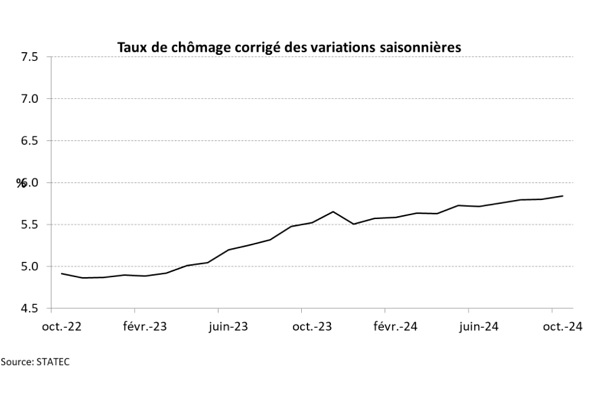 Credit: STATEC
Credit: STATEC
On Wednesday 20 November 2024, Luxembourg's employment agency, ADEM, reported that there were 18,293 resident jobseekers available for work at the end of October 2024; the unemployment rate once again remained stable over one month, at 5.8%.
The number of available resident jobseekers registered with ADEM as of 31 October 2024 stood at 18,293, an increase of 1,366 people (or 8.1%) compared to October 2023.
The number of jobseekers was on the rise for all unemployment periods. The most qualified jobseekers (university graduates) and people aged 30 to 44 once again experienced the largest increases.
Regarding professions, the most significant increases concern the road transport driving, culinary production, IT, and construction finishing sectors.
The number of new jobseeker registrations remained stable: 3,210 residents registered with ADEM in October 2024, a "negligible" increase of 27 people (or 0.8%) compared to October 2023. New registrations for the month in question include 81 registrations by beneficiaries of temporary protection (i.e. refugees from Ukraine).
The number of resident jobseekers receiving full unemployment benefits increased by 1,319 people (or 14.6%) over one year, to reach 10,375 as of 31 October 2024. The number of beneficiaries of an unemployment measure stood at 4,494, an increase of 6.3% compared to October 2023.
In October 2024, employers declared 3,170 vacant positions to ADEM, representing a slight increase (2.6%) compared to one year earlier. The total number of positions available at the end of the month stood at 6,698 - a decrease of 21.9% over one year. This decrease mainly impacts the accounting and management professions, as well as IT, legal, and professions in the financial sector.
ADEM noted that the overall number of vacancies has been decreasing, while the number of declared new positions has been increasing, as a result of vacant positions remaining open for less time on average. This trend, observed since September 2023, coincides with the entry into force of a new law to address the shortage of skilled labour. This procedure makes it possible to close job offers targeting the recruitment of third-country nationals more quickly. The professions listed above (accounting, IT, law, finance) are particularly affected by this development, according to ADEM.








